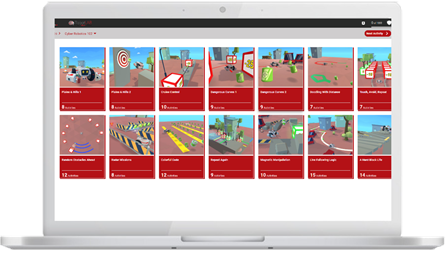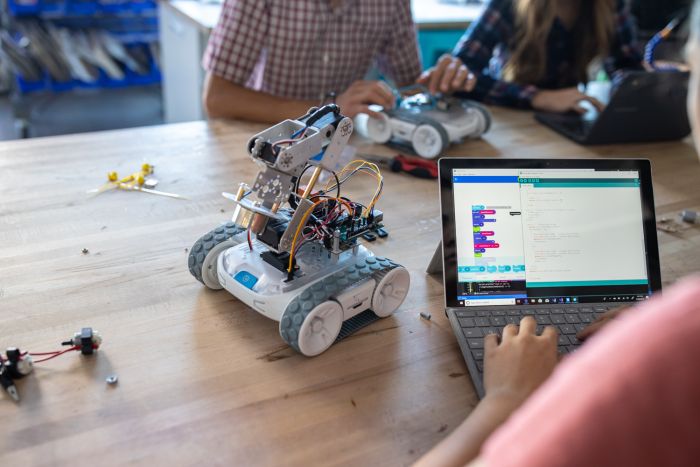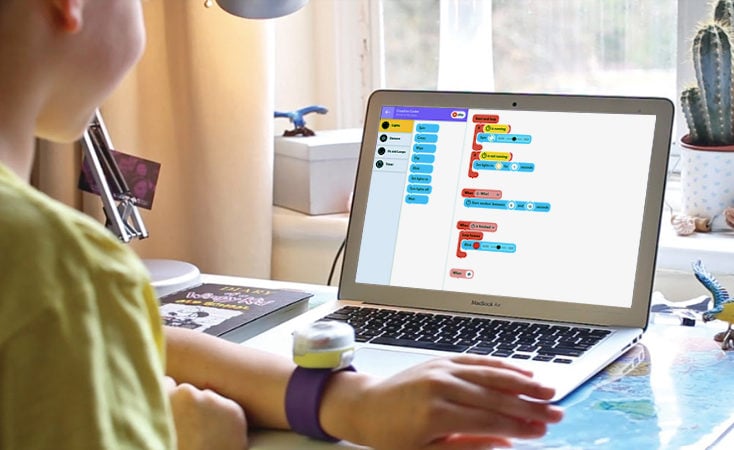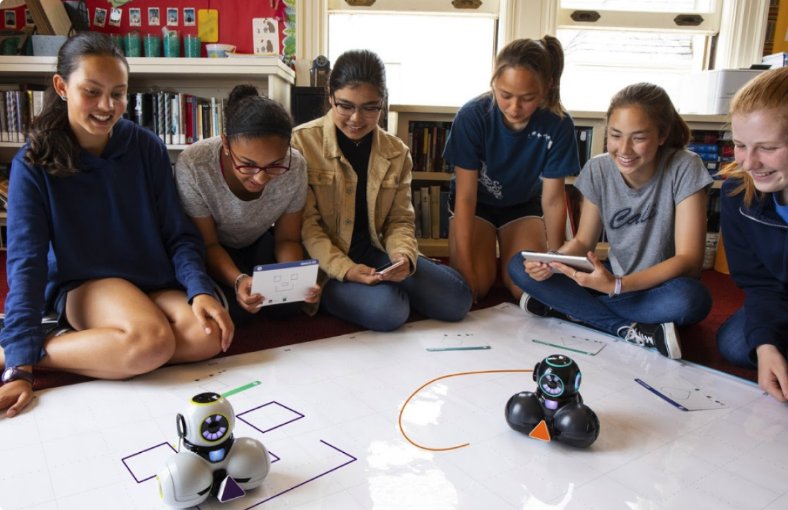RobotLAB Blog
Everything You Need To Know About Robotics in Businesses
Making Your Own Education When Traditional College Isn't an Option
Let me begin by informing you that a college education is not a necessity. It’s just one of the options to choose in a long list which consists of several other great alternatives. Hence you could even strike it out from the list and you would still have choices that are good enough to ensure a comfortable life for you.

- 0 Comments
- Apr 6, 2020 10:00:00 AM
- Posted by Natalia Galvis
- Topics: EdTech, STEM, Computer Science, Coding, Robots,, Learning, STEMchat, Edchat, teaching, coronavirus, homeschool, online
7 Keys To Effective Online Learning
High-quality and engaging online learning programs have a number of common characteristics.

- 0 Comments
- Apr 3, 2020 10:00:00 AM
- Posted by Natalia Galvis
- Topics: EdTech, STEM, Computer Science, Coding, Robots,, Learning, STEMchat, Edchat, teaching, coronavirus, homeschool, online
RobotLAB is offering free online Virtual Robotics and Coding courses to those affected by COVID-19.
We know that schools are being challenged with finding ways to convert their class activity into online lessons and how to train teachers to do so, all to ensure the continuation of education for the students.
Recognizing the enormous impact this situation has on all schools, we at RobotLAB, wanted to inform you of the following unique proposal by Amazon and Engage EDU Lite (Powered by CoderZ):
Amazon Future Engineer is offering free online Virtual Robotics and Coding courses for any student or teacher affected by school closures due to COVID-19 in the US.
Students and teachers at primary schools, middle schools and high schools are invited to program their own virtual robots through the Engage EDU Lite platform.
Check it out Here

Keep learning during COVID-19 with RobotLAB and CoderZ!
CoderZ is an online educational environment that improves students 21st century skills, while they are having fun programming their own virtual cyber robot. CoderZ and RobotLAB has different lessons to do at home! Check them out Here
- 8 Comments
- Apr 2, 2020 10:00:00 AM
- Posted by Natalia Galvis
- Topics: EdTech, STEM, Computer Science, Coding, Robots,, Learning, STEMchat, Edchat, teaching, coronavirus, homeschool
Why Learning to Code Benefits Kids, Regardless of Future Career Choice

“An understanding of computer science is becoming increasingly essential in today’s world. Our national competitiveness depends upon our ability to educate our children—and that includes our girls—in this critical field.”—Sheryl Sandberg
Sheryl Sandberg, the chief operating officer of Facebook, is one of many advocates of computer science education in our country. Educators, technology experts, business leaders, and even celebrities support a new movement with a clear purpose: to teach children to read and write code.
“Coding is the new literacy. To thrive in tomorrow’s society, young people must learn to design, create and express themselves with digital technologies,” says Mitchel Resnick, a media arts and sciences professor at the MIT Media Lab.
Coding is so important because its impact extends far beyond simply creating software and websites.
- 0 Comments
- Apr 1, 2020 10:00:00 AM
- Posted by Natalia Galvis
- Topics: EdTech, STEM, Computer Science, Coding, Robots,, Learning, STEMchat, Edchat, teaching, coronavirus, homeschool
Balancing Edtech Implementation in Classrooms
Edtech has encouraged teachers to trade the traditional white board for presentation slides and their usual instruction process for on-demand online courses. The explosion of state-of-the-art tools provides more opportunities for student development and helps educators become extra effective in the classroom.

By Carol Grace for RobotLAB.com
- 0 Comments
- Mar 31, 2020 10:00:00 AM
- Posted by Natalia Galvis
- Topics: EdTech, STEM, Coding, Robots,, Learning, STEMchat, Edchat, teaching, coronavirus, homeschool
Hospital uses VR to show how the coronavirus impacts the lungs
Doctors at George Washington University Hospital are using virtual reality to uncover the damage caused by COVID-19.

- 0 Comments
- Mar 30, 2020 10:00:00 AM
- Posted by Natalia Galvis
- Topics: EdTech, STEM, Coding, Learning, VR, STEMchat, Edchat, Computational thinking, teaching, coronavirus, homeschool
Math teacher uses COVID-19 to keep students learning during pandemic
Students all over the state are out of school right now as officials try to fight the spread of COVID-19 but one school in Oklahoma City is using the coronavirus to keep kids learning.

- 0 Comments
- Mar 27, 2020 10:00:00 AM
- Posted by Natalia Galvis
- Topics: EdTech, STEM, Coding, Learning, STEMchat, Edchat, Computational thinking, teaching, coronavirus, homeschool
How to Learn Computer Science? (from Zero to Hero)
I first learned about coding and computer science (CS) in college about 20 years ago. Looking back, not much has changed in the foundational concepts or core practices in CS. What has changed is who can teach it and where it can live in the curriculum—today educators in any subject can teach coding.

- 0 Comments
- Mar 26, 2020 10:00:00 AM
- Posted by Natalia Galvis
- Topics: EdTech, STEM, Coding, Learning, STEMchat, Edchat, Computational thinking, teaching, coronavirus, homeschool
Tips For Homeschooling During Coronavirus
With school closures happening all across the country due to the coronavirus outbreak, public schools are varying widely in what they offer. School districts have a legal obligation to provide equitable learning opportunities and it can be hard for schools to guarantee access to necessary hardware, like laptops and WiFi, for all students, so some are confining themselves to handing out optional "enrichment" lessons.

If you're one of the tens of millions of parents who are now essentially homeschooling your kids, we have some tips to help you keep your kids engaged and everyone sane:
- 0 Comments
- Mar 25, 2020 10:00:00 AM
- Posted by Natalia Galvis
- Topics: EdTech, STEM, Learning, STEMchat, Edchat, teaching, coronavirus, homeschool
Why STEM Matters in 2020

STEM Education, a term initiated by the National Science Foundation, is an educational approach which focuses on one or more of the four disciplines of science, technology, engineering, and math. In an era when technical and scientific skills are increasingly important in the work force, exposing children to STEM learning in the early years is key.
Currently, only 26% of STEM jobs are held by women. It is important to ensure that girls as well as boys are exposed to and encouraged in the area of STEM. It’s never too early to introduce STEM to your child and to consider how to sustain interest in STEM in elementary school.
- 0 Comments
- Feb 4, 2020 10:10:00 AM
- Posted by Natalia Galvis
- Topics: EdTech, STEM, 21st Century Classroom, Learning, STEMchat, Edchat, k12
Relevant Posts
- Augmented Reality: A Tool for Teaching Students Robot Programming
- Fostering Innovation Through Youth Education in STEM and EdTech
- How Parents Can Foster STEM Learning Beyond the Classroom
- How Robotics Cultivates a Deep Understanding of Mathematics in Students
- RobotLAB Receives EDTech Chronicle 2023 ‘BESTIE’ Award for Landmark Partnership with American Samoa Dept. of Education.
Subscribe to Email Updates
-
I Want To Learn MoreADDITIONAL INFORMATION
